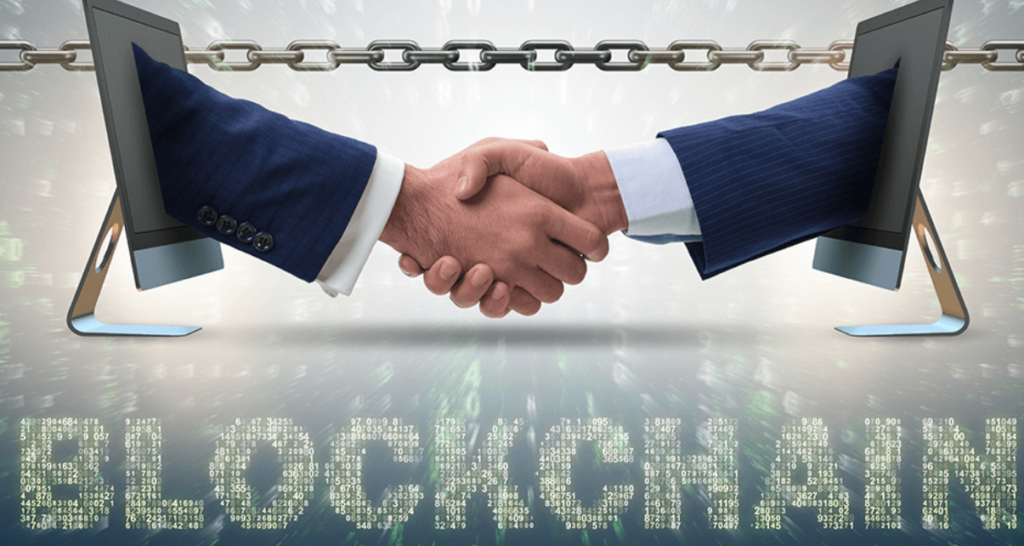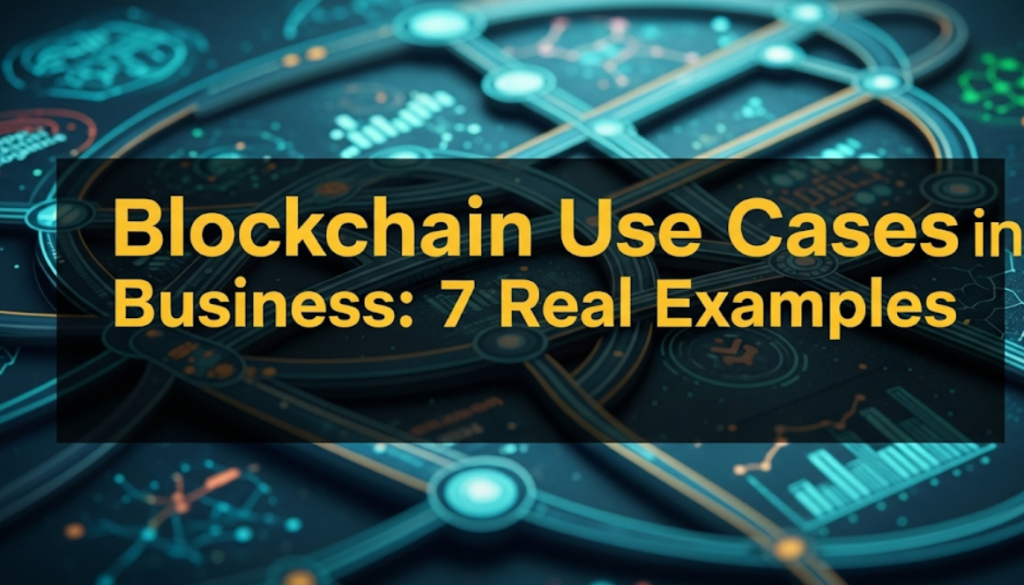The Business Revolution You Can’t Ignore
Applications of blockchain to business are not limited to technology discussions or hype around cryptocurrencies anymore. There are real-world companies currently solving actual problems with this technology.
Imagine that blockchain is like a digital notebook that everybody can read but nobody can delete or forge. Each page is duplicated in thousands of computers worldwide. This renders it almost impossible to cheat or forget information.
A lot of entrepreneurs believe that blockchain is too complicated or only for tech-savvy users. That’s not true anymore. Regular businesses are saving money, gaining customer trust, and working more effectively with the help of simple blockchain solutions.
This article demonstrates seven practical applications of blockchain technology in businesses today. You will see real-world usages that are easy to understand, not technical jargon.
The Case for Phenomenal Adoption of Blockchain Technology by Smart Businesses
Before getting into the details of specific examples, it’s time to understand why blockchain is important in business.
Conventional business systems tend to use middlemen. Banks process payments. Lawyers handle contracts. Documents are checked by governmental agencies. Every intermediary introduces an expense and a time factor.
Many of these middlemen are eliminated by blockchain. It builds trust using technology rather than human institutions.
The following are the key advantages that business entities want from blockchain:
- Better prices: Reduced middlemen will reduce the fees
- Quick services: There is no waiting time with banks or other institutions
- Enhanced security: Data is stored in thousands of computers
- Full transparency: No one can hide what occurred
- Reliability: The system is not dependent on any single point of failure or computer failure
1. Supply Chain Tracking: What is the Real Origin of Your Products?
Supply chain management is among the largest blockchain business applications today. Blockchain helps companies track products from production to the point of delivering them to customers.
Tracking Food Safety at Walmart
The use of blockchain enables Walmart to trace food products in only a few seconds rather than weeks. When a person becomes ill due to contaminated food, Walmart is able to discover where it came from.
Prior to blockchain, it used to take 6 days, 18 hours, and 26 minutes to trace a food safety problem. Now it takes 2.2 seconds.
Here’s how it works:
- The scanning of products happens when farmers are harvesting
- Products are scanned in trucks in transit
- Once the products are received in warehouses, they are scanned
- When products are in stores, they are scanned
- All this information gets recorded on the blockchain
This system came to the rescue of Walmart during the outbreak of E. coli on romaine lettuce in 2018. They quickly found safe sources of lettuce, stocked those products on shelves, and removed unsafe ones.
Diamond Certification with De Beers
The well-known diamond company called De Beers relies on blockchain to demonstrate that diamonds are genuine and unrelated to conflict. A digital certificate is placed on blockchain for every diamond.
The certificate includes:
- Where the diamond was mined
- Who cut and polished it
- Every person who handled it
- Evidence it is not a blood diamond used to finance wars
Customers have the option of scanning a QR code to view the full history of their diamond. This creates a sense of trust and warrants the higher cost of ethically sourced diamonds.
2. Smart Contracts: Automated Business Agreements
Smart contracts are another blockchain use case that has a significant impact on business. They are computer programs that automatically execute agreements when conditions are met.
Insurance Claims Processing
Smart contracts help insurance companies make claims more quickly and more cheaply. Conventional insurance claims need to be checked by humans, documented, and take weeks to process.
Smart contracts modify this process:
- Customer makes a claim on an app
- Smart contract validates the policy specifications
- The claim is confirmed by external data (weather reports, police reports, etc.)
- When everything checks out, it automatically processes the payment
AXA insurance employs smart contracts for flight delay insurance. You automatically get compensation when your flight has been delayed over 2 hours. No forms to fill out. No waiting for approval.
Real Estate Transactions
The real estate business deals with numerous parties: buyers, sellers, agents, law firms, banks, and government offices. All parties bring charges and create delays.
Companies are approaching property sales with blockchain and smart contracts to simplify the process:
- The blockchain keeps records of property ownership
- Escrows are carried out automatically by smart contracts
- Payments are made upon fulfillment of all requirements
- Records automatically update in the government systems
This makes transactions take only a few days instead of 30-45 days.
3. Digital Identity Verification: Secure Authentication
Each year, identity theft costs businesses billions of dollars. Blockchain provides a solution for secure identity verification.
Microsoft Decentralized Identity
Microsoft created an identity blockchain system called ION. You have your own digital identity, instead of Microsoft, Facebook, or Google holding your identity data.
The business benefits include:
- Customers can identify themselves without giving out personal information
- Businesses can verify customers without storing sensitive data
- Minimized risk of data breach
- Reduced privacy law compliance costs
Estonia Digital Citizenship
Estonia has established a national system of digital identity based on blockchain. All Estonians possess a digital ID that functions for:
- Voting in elections
- Filing tax returns
- Opening bank accounts
- Starting businesses
- Accessing healthcare records
This system helps save Estonia 2% of their GDP in administrative costs per year. This model is now being imitated by other countries.
4. Payment Processing and Money Transfers
Although the biggest hype surrounds cryptocurrency, a more realistic application of blockchain is in business payment processing.
International Payments
Conventional international business transactions are very slow and costly. Banks have fees of 3-7% and a 3-5 business day turnaround time.
Blockchain payment networks such as Ripple operate differently:
- Money is transferred within 3-4 seconds rather than days
- Fees are typically under 1%
- No requirement for correspondent banking relationships
- Available 24/7, not just business hours
Ripple is used by Santander Bank to make international payments. Blockchain is also used by American Express and MoneyGram to perform transfers faster and at a cheaper price.
5. Loyalty and Rewards Programs
Most businesses have problems with loyalty programs. Customers forget their points, points expire unused, and programs don’t transfer between companies.
Blockchain loyalty programs address these issues:
- Points are stored on blockchain, so they cannot be lost
- Points work across several business partners
- Unused points can be easily traded or sold by customers
- Companies obtain improved information on customer preferences
Singapore Airlines developed a blockchain-based loyalty program called KrisFlyer. Customers earn points that they can redeem at restaurants, gas stations, and shops in Singapore.
6. Healthcare Records Management
Healthcare is another industry with a fast-growing number of blockchain business use cases. Patient records tend to be distributed among various hospitals, physicians, and insurance companies.
Medical Record Security
Blockchain assists healthcare providers with sharing patient information securely:
- Patients control who gains access to their medical records
- Physicians receive complete medical histories immediately
- Treatments and medications can be verified with insurance companies
- Researchers can use anonymous data to conduct studies
MedRec, created by MIT, enables patients to provide temporary access to their medical records. They can allow a new physician 30 days of access, which then revokes automatically.
Drug Supply Chain Integrity
Approximately 250,000 people die every year as a result of fake medicines. Blockchain can verify the authenticity and safety of medicines.
A blockchain certificate on each medicine bottle shows:
- Which factory produced it
- What ingredients were used
- How it was transported and stored
- Which pharmacy sold it
Patients can scan a QR code to confirm that their medication is authentic.
7. Voting and Governance Systems
Businesses and organizations are relying on blockchain for internal voting and decision-making.
Corporate Shareholder Voting
Public companies must conduct shareholder votes on major decisions. Traditional voting can be costly with low turnout.
Blockchain voting systems offer several benefits:
- Shareholders can vote from anywhere around the world
- Elections are recorded publicly and cannot be altered
- Results are available as soon as voting is done
- Less expensive than using paper ballots
Nasdaq has implemented blockchain voting for several companies in Estonia and Delaware.

Supply Chain Governance
Large businesses with multi-layered supply chains use blockchain to vote on supplier governance.
For example, a clothing company may ask all suppliers to vote on new sustainability standards. Blockchain ensures:
- Only authorized suppliers can vote
- Each supplier gets one vote
- Votes are anonymous and verifiable
- Results cannot be manipulated
8. Digital Asset Management and Ownership
The last significant blockchain application in business is managing digital assets and ownership verification.
Intellectual Property Protection
Companies invest billions of dollars in defending their intellectual property. Blockchain can easily establish when an idea, design, or content was created.
Artists, writers, and inventors can:
- Upload their work to blockchain with timestamps
- Prove they created something before someone else could claim it
- Automate licensing of their work using smart contracts
- Collect royalties without intermediaries
Digital Gaming and Collectibles
The gaming industry uses blockchain to provide truly owned digital items. When games shut down, traditional video game items disappear.
Blockchain game items are different:
- Items truly belong to players
- Items can be traded or sold
- Items work across multiple games
- Rare items can be proven to be scarce
Companies such as Axie Infinity have built gaming economies where users earn real money by playing games and trading blockchain items.
For businesses looking to implement these advanced technologies, GlobTech AI provides comprehensive solutions in AI, blockchain, and cybersecurity to help organizations navigate digital transformation successfully.
Key Benefits Summary
| Business Use Case | Major Advantages | Time Saved | Cost Reduction |
|---|---|---|---|
| Supply Chain Tracking | Improved transparency, faster problem response | Days to seconds | 10-30% logistics costs |
| Smart Contracts | Automation, reduced intermediaries | 50-90% processing time | 20-50% administration costs |
| Digital Identity | Enhanced security, user control | Instant verification | 30-60% compliance costs |
| Payment Processing | Faster transfers, reduced costs | Days to seconds | 50-80% payment costs |
| Healthcare Records | Better coordination, patient control | Hours to minutes | 10-20% administrative costs |
| Voting Systems | Transparent, secure, convenient | Instant results | 40-70% election costs |
| Digital Assets | Provable ownership, automated licensing | Instant verification | 20-40% IP protection costs |
Common Problems and Solutions
Despite the numerous advantages of blockchain, businesses encounter challenges during implementation.
Technical Complexity
Many business owners worry that blockchain is too technical. The solution lies in collaborating with experienced blockchain development companies or utilizing existing platforms.
There’s no need to build your own blockchain. Numerous companies provide commercial off-the-shelf business solutions.
Energy Consumption
Some blockchain networks consume significant amounts of energy. However, newer blockchain technologies are much more efficient. Ethereum 2.0 consumes 99.95% less energy compared to the original version.
Regulatory Uncertainty
Most countries are still developing laws concerning blockchain. Companies must work with legal professionals familiar with blockchain regulations in their jurisdiction.
Integration with Existing Systems
Most businesses already have functioning computer systems. Blockchain solutions should complement, not replace, these existing systems.
Implementing Blockchain in Your Organization
To start exploring blockchain use cases for your company, here’s a simple approach:
Step 1: Identify Your Problems
Look for business issues that involve:
- Multiple parties who don’t fully trust each other
- High transaction or verification costs
- Slow processes with many intermediaries
- Information that should be transparent yet secure
Step 2: Start Small
Don’t attempt to blockchain everything immediately. Choose one problem and test a blockchain solution.
Most successful blockchain projects began as small pilots that expanded over time.
Step 3: Choose the Right Partner
Unless you have blockchain experts on staff, work with established companies. Look for partners who:
- Have success in your industry
- Can explain blockchain simply
- Provide ongoing support and maintenance
- Understand your existing business systems
Step 4: Measure Results
Track how blockchain impacts your business metrics:
- Cost savings through fewer intermediaries
- Time saved through automated processes
- Increased customer satisfaction
- New revenue opportunities
The Future of Business Blockchain Applications
The world of blockchain technology continues evolving. New applications are being developed every month.
Emerging Trends
Several trends are shaping the future of blockchain applications in business:
- Integration with Artificial Intelligence: AI systems are beginning to use blockchain to verify data and make automated decisions
- Internet of Things (IoT): IoT devices are using blockchain to securely share data and make automated payments
- Central Bank Digital Currencies: Various nations are creating government-issued digital currencies on blockchain networks
- Carbon Credit Trading: Blockchain is helping companies more effectively buy and sell carbon credits
Industry Predictions
Experts predict that by 2030:
- Half of large businesses will have at least one business process using blockchain
- Most supply chain management systems will use blockchain tracking
- Digital identity will be standard for online business transactions
- Smart contracts will automatically process routine business agreements

Frequently Asked Questions
What are the most common blockchain applications in business today?
The most popular blockchain applications in business are supply chain tracking, payments, digital identity, smart contract automation, and secure data sharing between business partners.
How expensive is blockchain implementation for businesses?
Implementation costs vary based on complexity and scope. Basic blockchain systems can cost $10,000-50,000, while more complex enterprise solutions can run $100,000-500,000 or more.
Is blockchain technology safe for business use?
Yes, blockchain is highly secure when implemented correctly. Its distributed nature makes it very difficult to hack or manipulate. However, businesses must maintain good security practices for user accounts and access controls.
Can blockchain benefit small businesses?
Blockchain can help small businesses, particularly with supply chain transparency, payment processing, and digital contracts. Many blockchain platforms now offer affordable solutions designed for small businesses.
How long does it take to implement blockchain in a company?
Simple blockchain applications typically take 2-6 months to implement. More complex enterprise solutions usually require 6-18 months for full implementation and integration with existing systems.
Which industries benefit most from blockchain?
Industries that benefit most include finance, healthcare, supply chain/logistics, real estate, legal services, and any industry requiring secure data sharing between multiple parties.
Does blockchain integrate with existing business software?
Yes, modern blockchain solutions are designed to connect with existing business systems through APIs and standard data formats. You generally don’t need to replace your existing software.
What skills do employees need to work with blockchain systems?
Most blockchain business applications are user-friendly. Employees don’t need to understand the underlying blockchain technology but do need basic computer skills and training on the specific blockchain application.
A Smart Move Forward
Blockchain use in business is no longer experimental. Early-adopting companies are benefiting from reduced costs, faster operations, and increased customer trust.
The key is to start with realistic expectations and clear business objectives. Blockchain isn’t magic, but it’s a powerful tool for solving specific types of business problems.
The seven examples in this article demonstrate that blockchain has applications across numerous industries and business functions. Whether it’s food safety tracking at Walmart or digital citizenship in Estonia, blockchain is providing real benefits to actual businesses.
Waiting until blockchain becomes standard in your industry isn’t an option. Begin exploring how these technologies can benefit your business. The learning curve may be steep initially, but the long-term benefits will be worth the effort.
Remember that all major business technologies started as experiments. Websites, email, and mobile apps all initially seemed complex. Now they’re business necessities.
Blockchain is no exception. The question isn’t whether blockchain will become standard in business – it’s whether your company will be ready when it arrives.

